Jarvis Hunt
Jarvis Hunt (August 6, 1863 - June 15, 1941) was a Chicago architect[1] who designed a wide array of buildings, including railroad stations, suburban estates, industrial buildings, clubhouses and other structures.
Jarvis Hunt | |
|---|---|
| Born | August 6, 1863 Weathersfield, Windham County, Vermont, U.S. |
| Died | June 15, 1941 (aged 77) St. Petersburg, Pinellas County, Florida, U.S. |
| Nationality | U.S. |
| Alma mater | Harvard University Massachusetts Institute of Technology |
| Occupation | Architect |
| Spouse(s) | M. Louise Coleman |
| Children | Louise Hunt McMurtry Cilley Jarvis Hunt Jr. |
| Parent(s) | Leavitt Hunt Katherine (Jarvis) Hunt |
| Buildings | Kansas City Union Station Joliet Union Station |
| Projects | National Golf Links of America Golf Course Chicago Golf Club |
Biography
Hunt was born in Weathersfield, Vermont,[2] and attended Harvard University and the Massachusetts Institute of Technology.[3], [4]
He had a passion for golf and qualified for the 1904 Olympics Golf Team, but failed to make the cut.[5] Hunt later designed the clubhouses of several clubs including the National Golf Links of America Golf Course, of which he was a founding member,[6] and the Chicago Golf Club.[7]
Most of his projects are associated with the United States Midwest, including the Kansas City Union Station and the Joliet Union Station.[8] Hunt based his architectural firm in Chicago's Monadnock Building.[9][10]
Hunt retired to his home in St. Petersburg, Florida in 1927. He died on June 15, 1941 in St. Petersburg.[7]
Family life
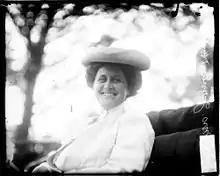
Hunt was the son of attorney, farmer and photography pioneer Colonel Leavitt Hunt and his wife, Katherine (Jarvis) Hunt.[11] His uncles were New York City architect Richard Morris Hunt[12] and Boston painter William Morris Hunt, and his grandfather was U.S. Congressman Jonathan Hunt.[13]
Hunt and his wife, the former M. Louise Coleman, had two children: Louisa Hunt McMurtry and Jarvis Hunt Jr.[14] Jarvis Hunt and his wife later divorced, and he was awarded custody of his two children.[15]
Projects
- Vermont Building, World's Columbian Exposition, 1893
- Arbor Lodge, Nebraska City, Nebraska, 1903
- Chicago and Alton Depot, Marshall, Missouri, 1906[16]
- Naval Station Great Lakes, 39 original buildings, 1903-1927
- Union Pacific headquarters, Omaha, Nebraska, 1910
- Gulf, Colorado and Santa Fe Railway depot, Temple, Texas, 1910[17]
- Indianapolis News Building, 1910 (National Register)
- Kansas City Star Building 1910 (National Register)
- Joliet Union Station, 1911-13 (National Register)
- 16th Street Station, Oakland, California, 1912
- Union Station (Kansas City), 1913 (National Register)
- Commerce Trust Building, Kansas City, Missouri, 1914 (National Register)
- Ayers Bank Building, Jacksonville, Illinois, 1914 (National Register)
- Union Station (Dallas), 1914-1916 (National Register)
- Newark Museum, 1923–26
- Hecht's Department Store, Washington, D.C.
- Chicago Golf Club Clubhouse, Wheaton, Illinois[18]
- Bamberger's Department Store, Newark, New Jersey[19]
- National Golf Links of America Clubhouse, Southampton, New York
- Walden, Estate of Cyrus H. McCormick II, Lake Forest, Illinois, 1896 (main house demolished, 1950s)[20]
Gallery
.jpg.webp) Union Pacific Railroad Headquarters Building, Omaha, Nebraska
Union Pacific Railroad Headquarters Building, Omaha, Nebraska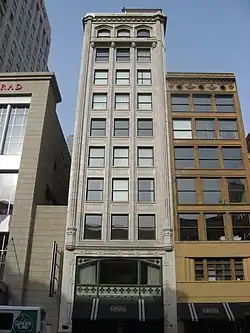 Indianapolis News Building, Indianapolis, Indiana
Indianapolis News Building, Indianapolis, Indiana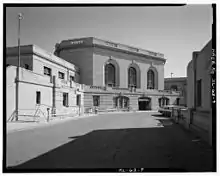 Union Station, Joliet, Illinois
Union Station, Joliet, Illinois Union Station in Kansas City
Union Station in Kansas City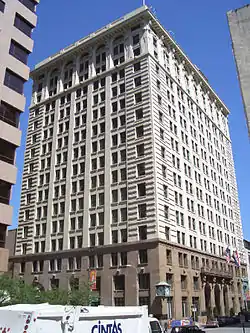 Commerce Trust Building, Kansas City, Missouri
Commerce Trust Building, Kansas City, Missouri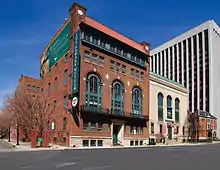 Newark Museum
Newark Museum Hecht's Department Store, Washington, D.C.
Hecht's Department Store, Washington, D.C._02.JPG.webp) Bamberger's Department Store, Newark, New Jersey
Bamberger's Department Store, Newark, New Jersey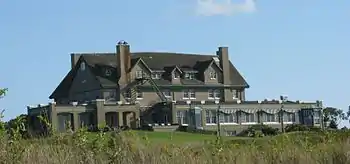 National Golf Links of America
National Golf Links of America
References
- Mincer, Jilian (8 February 1998). "Restoring Historic Union Station in Kansas City" – via NYTimes.com.
- "The Dream City: The Vermont Building".
- "Union Station, Kansas City, National Register of Historic Places Inventory, United States Department of the Interior" (PDF).
- "Jarvis Hunt, Architect and Member". CGC Foundation. Retrieved 28 November 2020.
- "Jarvis Hunt". Olympedia. Retrieved July 4, 2020.
- "The National Golf Links of America, The American Golfer, Vol. IV, No. 8, August 1910" (PDF).
- "Jarvis Hunt". Sports Reference LLC. Archived from the original on May 14, 2014. Retrieved May 14, 2014.
- "Jarvis Hunt, architect". University of Illinois at Chicago. Retrieved May 14, 2014.
- Western architect (1917). The Western Architect, Volumes 25-26. Western architect, Incorporated. p. 72.
- Chicago Architectural Club (1910). Annual of the Chicago Architectural Club. Chicago Architectural Club. p. 1.
- "Annals of Brattleboro, Vol. II, Chapter LXIX, Biographical Sketches". Archived from the original on 2011-01-29. Retrieved 2010-01-07.
- The Nelson-Atkins Museum of Art: Culture Comes to Kansas City by Kristie C. Wolferman - University of Missouri Press - 1993 ISBN 0-8262-0908-4
- "Michigan Boulevard Building". Designslinger. Retrieved May 10, 2014.
- "National Register of Historic Places Registration Form, Commerce Trust Company Building, United States Department of the Interior" (PDF).
- "Archives: Chicago Tribune - JARVIS HUNT WINS CHILDREN".
- Gibbs, Donna M. (April 3, 1979). "National Register of Historic Places Inventory -- Nomination Form" (PDF). State Historic Preservation Office. Missouri Department of Natural Resources. Retrieved July 25, 2016.
- "Authentic Texas Spring 2019". issuu. Retrieved 2019-04-07.
- "hunt".
- GmbH, Emporis. "Macy's Department Store, Newark - 121302 - EMPORIS".
- "Jarvis Hunt: works".
Further reading
- "JARV1S HUNT; Architect Erected the Vermont Building at '93 Chicago Fair". New York Times. June 17, 1941. Retrieved 2008-08-10.
External links
| Wikimedia Commons has media related to Jarvis Hunt. |
- Jarvis Hunt, architect, biography
- Jarvis Hunt, list of works
- Proposal for the Reorganization of the Railway Terminals of Chicago, An Address Before the City Club of Chicago, June 5, 1913, by Jarvis Hunt, Architect
- The Colony at the Chicago Golf Club, Wheaten and unincorporated DuPage County (Jarvis Hunt, c. 1898–1916), Landmarks Illinois